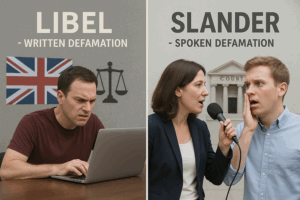How to defend against a defamation claim?

Someone’s threatening to destroy your reputation and bankroll with a defamation lawsuit. The accusation feels like a dagger, but before panic sets in, understand this: UK law is built to protect honest communication. Whether it’s truth, honest opinion, or genuine public interest, robust defences exist to crush baseless claims. That cease and desist letter might look terrifying, but it’s often the weakest hand played loudest. Smart defence strategies can turn their attack into your victory. Consult a defamation solicitor or litigation specialist who understands these battles inside out.

Key Takeaway: Can you actually win a defamation case against you?
Discover the exact defence strategies that turn threatening cease and desist letters into your legal victories.
What should you do first when accused of defamation?
The moment that cease and desist letter arrives, your next moves determine everything. Acting rashly can strengthen their claim, while strategic responses often expose their weaknesses.
-
Receiving a cease and desist letter
This document represents their attempt to resolve matters without court proceedings.
- Don’t panic; this isn’t a court order; it’s a negotiation opener.
- Check if it’s from actual solicitors or just intimidation tactics.
- Screenshot the letter immediately before it disappears from email.
- Note the response deadline but don’t feel bound by artificial urgency.
-
Immediate actions to take
Your first 48 hours are crucial for protecting your position.
- Cease publication temporarily if still accessible online.
- Research the complainant’s litigation history and public profile.
- Avoid discussing the matter on social media or with colleagues.
- Contact your professional indemnity insurance if coverage exists.
- Don’t contact the complainant directly; this rarely helps your defence.
-
Preserving evidence
Evidence gathered now could make or break your defence later.
- Keep records of your research sources and factual basis.
- Collect supporting documents that prove truth or honest opinion.
- Archive all original communications, posts, or publications mentioned.
- Download metadata from digital files before it’s automatically deleted.
- Gather witness statements from those present during relevant conversations.
Which legal defences can destroy a defamation case?
UK law provides three complete defences against defamation claims, and establishing any one of them ends the case in your favour. These defences don’t just weaken their position; they can trigger costs orders against accusers who pursue hopeless litigation.
-
Truth as an absolute defence
If your statement is substantially true, their claim fails completely.
- Doesn’t require 100% accuracy.
- Substantial truth is sufficient under UK law.
- Burden shifts to claimant to prove your statement was false.
- Court precedent shows minor inaccuracies won’t defeat truth defence.
- Even embarrassing truths are protected; discomfort doesn’t equal defamation.
- Documentary evidence, witness testimony, and expert reports strengthen this defence.
-
Honest opinion protection
Your genuine beliefs based on true facts cannot be defamatory.
- Claimant must prove you didn’t genuinely hold that opinion.
- Must be an opinion an honest person could hold on those facts.
- Doesn’t matter if others disagree; subjectivity is protected speech.
- Opinion must be based on facts that existed when you expressed it.
- Covers reviews, critiques, social media comments, and editorial content.
-
Public interest defence under the Defamation Act 2013
Publishing information that serves the greater good enjoys special protection.
- Court weighs public benefit against individual harm.
- Must reasonably believe publication was in public interest.
- Academic discourse and scientific debate often qualify for this defence.
- Covers whistleblowing, investigative journalism, and consumer warnings.
- Includes matters of public health, safety, and governmental accountability.
Your other legal defences against a defamation accusation
Beyond the big three defences, UK law offers additional statutory protections that can stop claims in their tracks. These specialised defences cover specific circumstances and publishing contexts that standard protections might miss.
-
Privilege protections
Certain situations grant you complete immunity from defamation claims.
- Absolute privilege covers court proceedings, parliamentary debates, and judicial reports.
- Qualified privilege protects communications made in good faith with legitimate interest.
- Applies to employment references, board meetings, and regulatory complaints.
- Covers fair and accurate reporting of court cases and public meetings.
- Lost if you act with malice or exceed the privileged occasion.
-
Innocent dissemination
Distributors and platforms often escape liability through this defence.
- Website hosts and booksellers frequently rely on this protection.
- Must prove you didn’t know content was defamatory when published.
- Protects those who didn’t author, edit, or control the defamatory content.
- Requires showing you exercised reasonable care regarding the publication.
- Covers internet service providers, search engines, and social media platforms.
-
Offer of amends procedure
This statutory route can resolve disputes without full litigation.
- Often cheaper than fighting a claim through to trial.
- Must be made before filing a defence to court proceedings.
- Protects against costs liability if offer is reasonable but rejected.
- Court assesses whether offer adequately addresses the defamatory impact.
- Allows defendants to make formal apology and correction plus compensation.
How do you build a winning defence strategy?
Your defence isn’t just about having the law on your side; it’s about proving it with bulletproof evidence and tactical precision. A scattered approach hands victory to your opponent, while systematic preparation turns their claim into your courtroom triumph.
-
Gathering supporting evidence
Your defence lives or dies on the quality of evidence you collect.
- Document every source that supports your truth defence with original receipts, emails, records, witness statements from firsthand observers, and expert testimony to validate technical or professional claims.
- Preserve digital evidence immediately including social media posts, news articles, public records, email chains, and meeting minutes that demonstrate your good faith and factual basis.
-
Assessing the strength of your position
Honest evaluation prevents costly mistakes and guides settlement decisions.
- Rate your evidence quality from conclusive proof to circumstantial support while identifying weaknesses before opponents exploit them and calculating damages exposure versus litigation costs.
- Consider the claimant’s financial resources, appetite for litigation, and reputational risks of fighting versus settling to make informed strategic decisions.
-
Legal precedents and case law analysis
Previous court decisions can make or break your defence arguments.
- Research similar defamation cases with comparable facts, Court of Appeal decisions, and Supreme Court rulings that favour your position while studying judicial commentary on evidence standards
- Use legal databases to find cases where courts rejected similar claims using your chosen defence and track recent developments in defamation law that strengthen your arguments
How do you navigate the legal process and manage costs?
Once formal proceedings begin, every decision impacts your defence strength and financial exposure. The law rewards defendants who engage constructively with settlement opportunities before expensive court battles.
-
Pre-action protocol and settlement options
Formal complaints trigger strict procedural requirements that determine case outcomes.
- Strategic response: Pre-action protocol requires detailed responses outlining your defence and evidence within tight deadlines. Alternative dispute resolution through mediation resolves claims faster and cheaper than litigation. Settlement negotiations must avoid admitting liability while protecting reputation.
- Cost protection: Early engagement preserves defences while demonstrating good faith. Reasonable settlement offers shift adverse costs risk to claimants who reject sensible proposals.
-
Court proceedings and financial management
Balance defence strength against escalating legal costs exposure.
- Trial essentials: Defence statements must detail every defence with supporting evidence. Burden of proof varies; truth needs facts, honest opinion needs genuine belief. Prepare witness statements and expert reports.
- Funding options: Conditional fee arrangements offer no-win-no-fee but need after the event insurance for opponent’s costs. Check existing legal expenses insurance coverage. Calculate costs versus potential damages early.
Do I need a solicitor for my defamation defence?
Defamation law is specialist territory where self-representation typically fails. Professional representation protects against financial ruin and reputational destruction. The complexity of defences demands expert navigation.
- Strategic advantage: Lawyers identify multiple defences combining truth, honest opinion, and public interest for maximum protection. Professional settlement negotiations achieve better terms than direct communication.
- Technical expertise: Evidence gathering follows strict protocols ensuring trial admissibility. Witness statements need specific formatting to survive cross-examination. Expert reports require careful commissioning.
- Cost management: Navigate conditional fee arrangements and after the event insurance to minimise exposure. Case budgeting prevents spiralling costs while ensuring adequate defence funding.
- Procedural compliance: Pre-action protocol responses need technical precision. Defence statements must detail every defence with supporting facts. Court deadlines demand professional management.
FAQs
- Can I avoid court by offering a correction or apology? Yes, the offer of amends procedure allows formal correction, apology, and compensation before court proceedings. This defence can resolve claims without litigation and protects against adverse costs if your reasonable offer is rejected.
- What if defamatory content was published by third parties on my website? The innocent dissemination defence may protect website operators who didn’t author or control the content. You must prove you didn’t know it was defamatory and exercised reasonable care with proper moderation policies.
- How long do I have to respond to a defamation claim? Pre-action protocol gives 14-28 days for detailed responses. Court proceedings require acknowledging service within 14 days and filing your defence within 28 days. Missing deadlines risks default judgment.
Defamation claims aren’t insurmountable challenges. UK law provides robust defences through truth, honest opinion, and public interest protections. Early professional intervention transforms threatening cease and desist letters into manageable legal challenges, protecting both reputation and finances.
Fight back!
Qredible’s network of specialist defamation solicitors has successfully defended hundreds of claims using proven defence strategies.
KEY TAKEAWAYS
- Powerful legal protections exist under UK law to defend against defamation claims, including truth as an absolute defence, honest opinion protection, and public interest justification under the Defamation Act 2013, plus additional statutory defences like privilege and innocent dissemination.
- Strategic response to cease and desist letters and formal complaints requires immediate evidence preservation, careful defence planning, and professional legal guidance to navigate complex pre-action protocols and court procedures while protecting against escalating legal costs.
- Specialist defamation solicitors are essential for successful defence because they identify multiple defences, manage conditional fee arrangements, ensure procedural compliance, and often achieve better settlement outcomes than self-representation attempts.
https://protect-advice.org.uk/defamation-whistleblowing/https://www.carruthers-law.co.uk/our-services/defamation/defamation-defences/https://www.nathsolicitors.co.uk/2024/08/30/exploring-defamation-defences-truth-and-honest-opinion/https://civillitigationlawyers.co.uk/legal-process-in-defamation-cases/
Do you need a solicitor?
Find a solicitor on Qredible in just a few easy steps

















